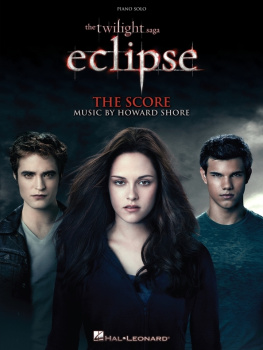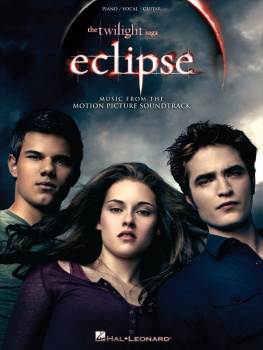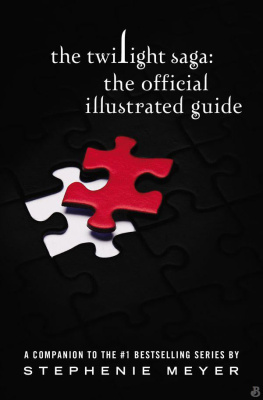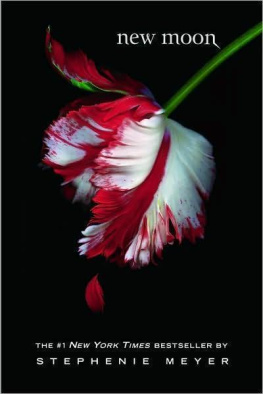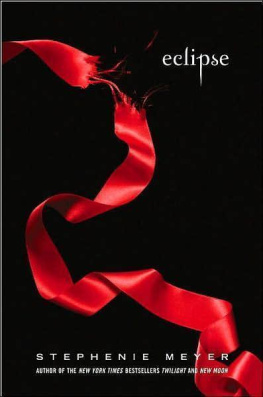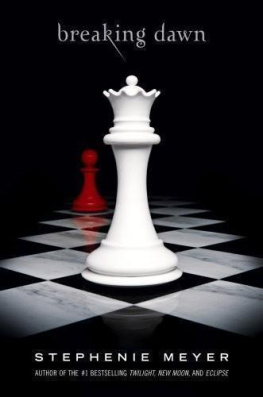
THIS PUBLICATION HAS NOT BEEN PREPARED, APPROVED, OR LICENSED BY ANY ENTITY THAT CREATED OR PRODUCED THE WELL-KNOWN TWILIGHT SAGA BOOK OR FILM SERIES.
All rights reserved. No part of this book may be used or reproduced in any manner whatsoever without written permission except in the case of brief quotations embodied in critical articles or reviews.


Smart Pop is an Imprint of BenBella Books, Inc.
10300 N. Central Expressway, Suite 400
Dallas, TX 75231
www.benbellabooks.com
www.smartpopbooks.com
Send feedback to feedback@benbellabooks.com
Printed in the United States of America
10 9 8 7 6 5 4 3 2 1
Library of Congress Cataloging-in-Publication Data is available for this title.
ISBN 978-1-936661-12-1
Copyediting by Erica Lovett
Proofreading by Michael Fedison
Cover design by Faceout Studio
Text design and composition by Neuwirth & Associates, Inc.
Printed by Berryville Graphics
Distributed by Perseus Distribution
http://www.perseusdistribution.com/
To place orders through Perseus Distribution:
Tel: (800) 343-4499
Fax: (800) 351-5073

COPYRIGHT ACKNOWLEDGMENTS
Bella and the Psychobiology of Love and Attraction Copyright 2011 by David A. Frederick, et al
Team Jacob Copyright 2011 by Erica Berg
The Case for Edward Cullen Copyright 2011 by Susan Carnell
Prejudice in Twilight Copyright 2011 by Melissa Burkley
Vampires and Werewolves Arent So Different After All Copyright 2011 by Amanda M. Vicary and Jennifer L. Rosner
The Gestalt of Twilight Copyright 2011 by Mikhail Lyubansky
Vegetarian Vamps Copyright 2011 by Robin S. Rosenberg
Self-Regulation: The Secret to Success in Twilight Copyright 2011 by Jeremy Clyman
Motorcycles, and Strangers, and Cliff Diving! Oh, My! Copyright 2011 by Catherine R. Glenn
Its All in the Family Copyright 2011 by Lisa M. Dinella and Gary W. Lewandowski Jr.
Transcendence and Twilight Copyright 2011 by Tamara McClintock Greenberg
The Emotional Pleasures of Reading Twilight Copyright 2011 by Peter G. Stromberg
The Twilight Convergence Copyright 2011 by Pamela Rutledge
Introduction and essay introductions Copyright 2011 by
E. David Klonsky and Alexis Black
Other Materials Copyright 2011 by BenBella Books, Inc.
contents
introduction
W e (David and Alexis), like millions of people across the world, are Twilight fans. Actuallywhen we say were fans, we mean something a little more involved than just reading the books. Weve attended midnight releases of the books and movies, dressed up in glitter and Twilight T-shirts to surprise our friends at the airport, and just may have read all of the books ( Midnight Sun! ) too many times to count. And were thrilled to have this opportunity to combine two of our interests: psychology and Twilight.
Were a husband and wife team, so it may not be surprising that many of our reasons for enjoying Twilight are similar. Were both compelled by the chemistry between Edward and Bella. We love Charlie, Bellas somewhat distant but unquestioningly loving dad. We both remember the emotional roller-coaster of high school, and what its like to experience unrequited love, like Jacob does. And we love spending time with the complex, three-dimensional world of characters that Stephenie Meyer has createdincluding the Volturi, the Quileute, and the Cullen clan.
At the same time, weve disagreed about many thingsand passionately! For starters, Alexis is Team Edward, and David is Team Jacob.
We also disagree about why Bella and Edwards relationship is so compelling for so many. David emphasizes immortality. He argues that many fairy tales tell captivating stories of intense and perfect love. But unlike Romeo and Juliet, Cinderella and her prince, Elizabeth and Mr. Darcy, and other couples from classic love stories, only Edward and Bella have a chance to truly live happily ever after. What Edward and Bella fight for is not just the chance to love each other for the rest of their mortal lives, but to love each other forever .
Alexis, on the other hand, believes the storys true power lies in the unchanging nature of Bella and Edwards love. The sad thing about Cinderella and her prince, and even Elizabeth and Mr. Darcy, is that the feelings they initially experience will eventually changeand may even fade, or disappear. But vampire emotions rarely change. When they do, Edward tells us, the change is permanentTheres no going back. Edwards and Bellas feelings for each other will never fade. They are guaranteed to feel as much passion for each other fifty years from now as they do on the last page of Breaking Dawn . The constancy of their love is more important than immortality. As Bella says, even death would be a happy ending, as long as she and Edward were together.
This may seem like a minor disagreementbut weve argued it back and forth (sometimes loudly) for years!
What is it about the Twilight Saga that fuels this kind of passion? Why do some readers (ahem, like Alexis) return to these books over and over again?
The authors who contributed chapters to this book wrestle with these questions too. They also happen to be experts in psychology and so are able to share interesting and insightful perspectives on the ways the Twilight Saga reflects our real, human relationships and behaviors. Some are interested in the lessons we can learn from how the Twilight characters behave and relate to each other: for instance, how the Cullen family can serve as a positive model for well-functioning human families, or how Stephenie Meyer manipulates stereotypical imagery in a way that both relies on and challenges our societal prejudices. Some of the authors explore, instead, the reasons why Twilight is so psychologically compelling. And, of course, other authors weigh in on perhaps the most common question of all: Team Edward or Team Jacob?
What all of the psychologists whove written these chapters can agree on is that the characters of Twilightwhether theyre human, vampire, or werewolfembody real human desires and real psychological traits. In fact, this may be the crucial reason that Twilight appeals to so many. We care about Bella, Edward, and Jacob, because so much of us is in them: we share similar desires, mistakes, passions, and triumphs. Exploring the psychology of Twilight is not only a chance to delve deeper into the Saga we love, but an opportunity to gain a bit more insight into our own hearts and minds. We believe that these essayslike the Twilight saga itselfcan change the way you think about your own love, relationships, and family.
We hope that you enjoy reading these essays as much as we haveand that theyll contribute to the way you think about the characters of Twilight and the whole Twilight universe.
David and Alexis
Summer 2011
bella and the psychobiology of love and attraction

David A. Frederick, Amelia Moghaddam Jafary, Melissa R. Fales, Tania A.Reynolds, Felix S. Lurye, Melissa E. Phuphanich, Erica B. Stanley
There are lots of things to love in the Twilight Sagathe wolf pack, the Cullens, Charliebut what keeps us coming back, over and over again, is the love of Edward and Bella. Why is this love so special? Why doesnt Bella fall head over heels for Mike Newton, or Edward swoon for Tanya Denali? David Frederick and colleagues offer fascinating insight into the psychological and biological ingredients that make for the most intense forms of love. Its clear: Bella and Edwards looks, smells, shared experiences, and DNA create the perfect storm of intense love and attraction.
Next page


